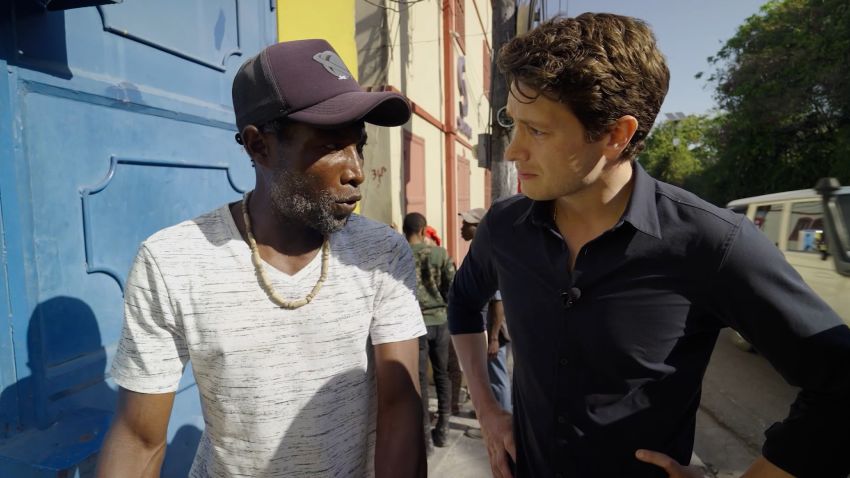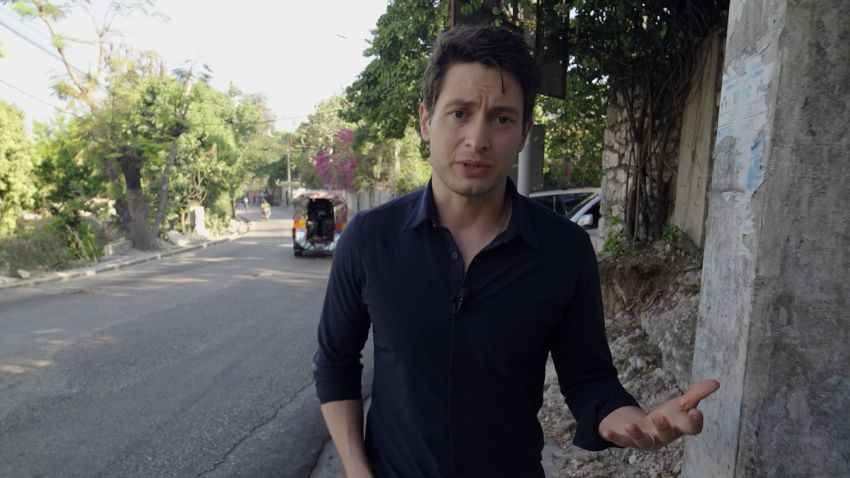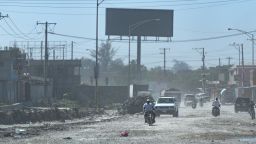A woman hustles her young child into a waiting car, half-dragging him as she shields his eyes. Other family members follow with heavy suitcases, averting their eyes too. They’re leaving the city, even though the drive through gang-controlled roads is risky.
The reason lies in the street before their house: A burned corpse; the remains of a suspected gang member killed by their neighbors. His knees are bent and torso pitched forward as if in supplication, metal wires wrapped around the charred flesh. This is the fourth such corpse CNN has seen in two days.
Just up the hill, another mother is rushing toward a waiting helicopter holding her infant. Eyewitnesses tell CNN that she left her car seat behind, urged to move quickly by armed guards. The unauthorized helicopter landing is attracting attention; video of the flight shows a fight breaking out on the ground as the chopper lifts off.
They’re fleeing anarchy. Until yesterday, people like these were the holdouts; the ones who had a choice but stayed until Port-au-Prince became unbearable. Now even they are leaving amid an unprecedented frenzy of terror in the Caribbean nation.
For three weeks, Haiti’s capital has been trapped in a gory cycle that far exceeds the kidnapping and gang violence for which it was already known. An insurgent league of heavily armed gangs is waging war on the city itself, seeking new territory and targeting police and state institutions. Scared and angry, vigilante groups are blocking off their neighborhoods with felled trees and chains, killing and burning outsiders suspected of gang membership. It’s the only way, they say, to defend themselves.
Human remains are lying in the streets, yet the multinational security mission long touted by Haiti’s neighbors as a game-changer for its gang problem is nowhere to be found.
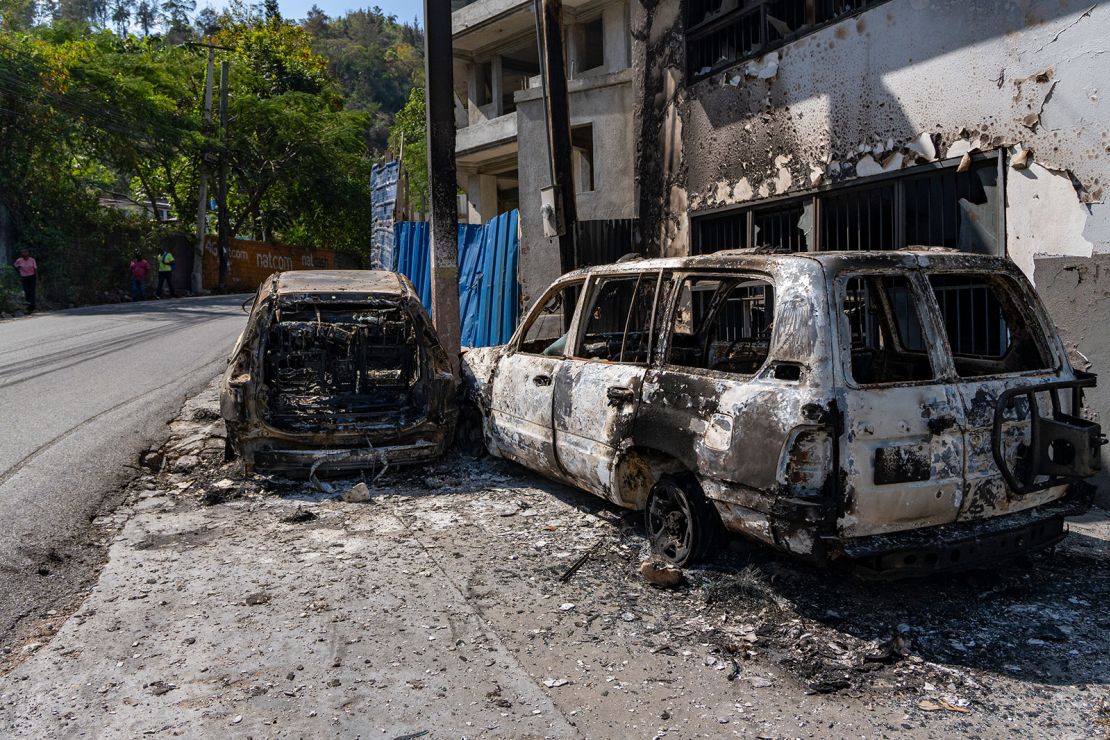
Warning after warning
Haiti could have changed course. It’s been nearly 18 months since Prime Minister Ariel Henry first requested foreign military assistance, a period in which the gangs steadily expanded their reign of terror across an estimated 80% of the city.
Other missed exits: Nearly six months have passed since the United Nations Security Council authorized a military support mission, with the backing of the United States. Two months have passed since Roberto Alvarez, foreign minister of the neighboring Dominican Republic, warned that council that Haiti stood on “the edge of the precipice.”
When Haiti’s gangs began this wave of violence at the end of February, they demanded the resignation of the unpopular prime minister. He capitulated – but they kept rampaging.
Ten days have now passed since CARICOM announced that Haiti would set up a transitional council, but no one has been named to it. The killings continue each day.
Leslie Voltaire, a candidate for the transitional council, told CNN Thursday that he was frustrated with how long the political process was taking while gangs gained territory.
He was confident that a transitional council could now come together within the next 24 hours. Voltaire was also clear that the next steps would take longer – he predicted the appointment of a prime minister within a week, followed by creation of a national security council.
The reopening of Haiti’s port and airport could happen within the first 100 days, he said – a potentially long wait in a country where nearly half the population doesn’t have enough to eat, according to the World Food Programme.
Police say they need backup
Much of the Haitian state has disintegrated, its courts occupied by gangs, its prisons left open, the prime minister effectively exiled with the country’s finance minister acting in his role. Haiti’s Ministry of Communications buildings is itself overrun by refugees fleeing gang attacks – in its front office, hungry children now sit on the floor and swing on rolling desk chairs.
Haiti’s National Police may be the only fully functional state institution left. But they are underequipped and overstretched, they say. Every day, police respond to gang attacks, beating them back in gun battles that echo throughout the city, only to be pulled to a new neighborhood the next day, while the gangs reclaim their hard-won territory.
Multiple police officers told CNN that they do not have what they need to continue the fight. “We are willing to fight, we are ready to save the country,” Garry Jean Baptiste, adviser to the Haitian National Police Union 17, told CNN. “But we don’t have any leadership, our equipment is falling apart, and we need air and marine support.”
Only between 30% and 40% of the police have bullet-proof vests, and the average police officer is paid less than $200 per month, he estimated. With a government in flux and low morale in the ranks, he worries that the multinational force will fail.
The force is expected to be led by Kenya and include personnel from Kenya, Jamaica, Benin, Bahamas, Barbados and Chad.
“We are ready for (the) multinational support force,” Baptiste said. “We’re ready to work with them. But the plan to receive the mission is not laid out; we think the mission will fail like the others because there is no framework to work together.”
Security and humanitarian issues in this city are tightly intertwined; experts say that the nation’s immediate need for clean water and food mean the focus must be on bringing Port-au-Prince’s port and airport back online. But that means taking back territory and clearing safe transport corridors through a city currently carved into gang territories.
In a sign of the uncertainty around Haiti’s ability to push back the gangs, Voltaire, the council candidate, said that the next government might consider hiring private security companies.
Bounty hunters should, he added, consider pursuing gang leaders, one of whom was reportedly killed in Port-au-Prince on Thursday night. Ti Greg was killed in the Delmas 66 neighborhood in a gunfight with police, a source said.
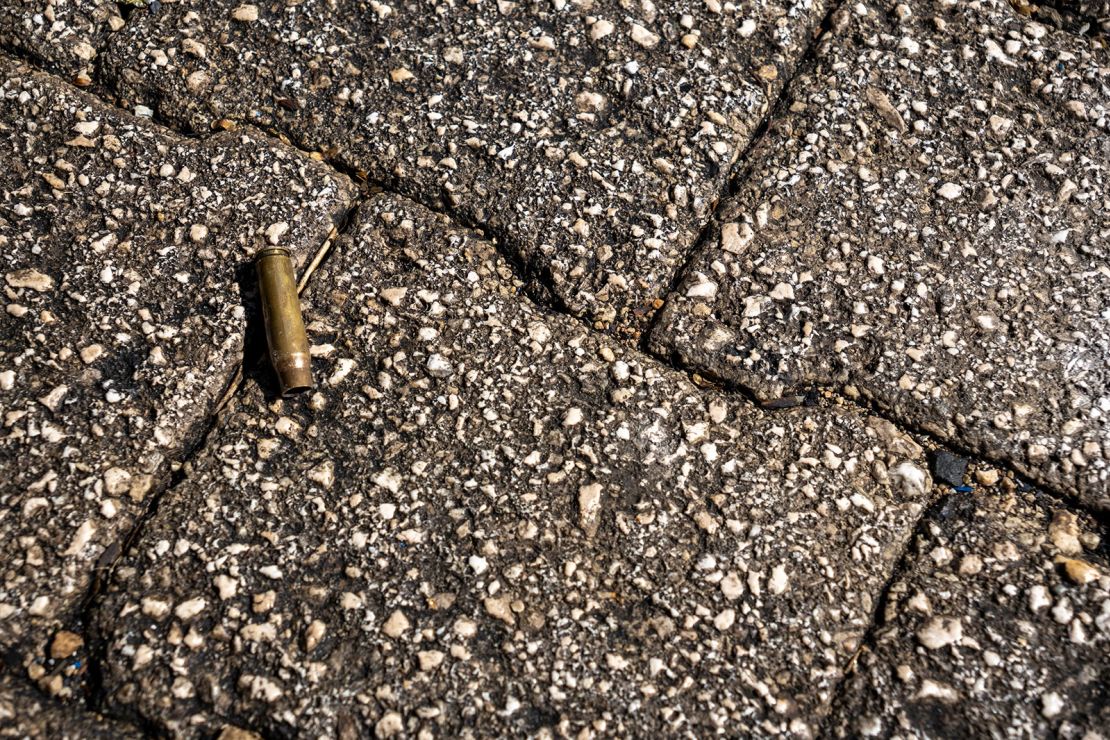
A controversial solution
While adding foreign forces may be Haiti’s best chance at breaking the gangs’ grip, inviting them in is politically fraught.
“It’s the international community that put us in this situation. For over 200 years, they haven’t given us a chance to live for ourselves,” said one man to CNN, sitting on his motorbike as he watched vehicles pass another charred body in the street.
Enslaved people in Haiti overthrew brutal French colonial rule and founded the world’s first free Black republic in 1804, only to be shunned by the international community for decades.
“How else do you explain the fact that today it’s CARICOM deciding for Haitians?” he said.
Still, given the crisis in Port-au-Prince, even those who find the idea of foreign hands in the country distasteful may be coming around. As Dominique Dupuy, Haiti’s ambassador to UNESCO in Paris, told the body this week, Haiti has nowhere else to turn from its “bloody nightmare.”
“From the depths of the hole where we find ourselves, we see the hands of those who pushed us there,” Dupuy said. “These hands which could still, if they wanted, extend a pole to us.”
In Port-au-Prince’s upscale neighborhood of Petion-Ville, Marie Lucie Macone, a street fruit vendor, told CNN that she thought the United States should do more.
“So many people have died now. Their bodies have had to be picked up in the street so many times,” the 69-year-old said. “We should pray to God to speak to the Americans and ask them for help.”
She, like many, is struggling to survive even away from the direct violence, her produce rotting on the stands as roadblocks and fear keep customers home, she told CNN.
But if the arrival of a multinational security mission seems far off, any hopes for an American intervention appear to be the stuff of history books; US operations in Haiti have so far focused on evacuation flights for American citizens, an undertaking that only started Wednesday.
Meanwhile, the air above Port-au-Prince buzzes constantly with private flights for diplomats and the well-connected.
The constant coming and going of helicopters scares Marie Lucie, she said.
“Are we going to die? If you know, you should tell me,” she said.
